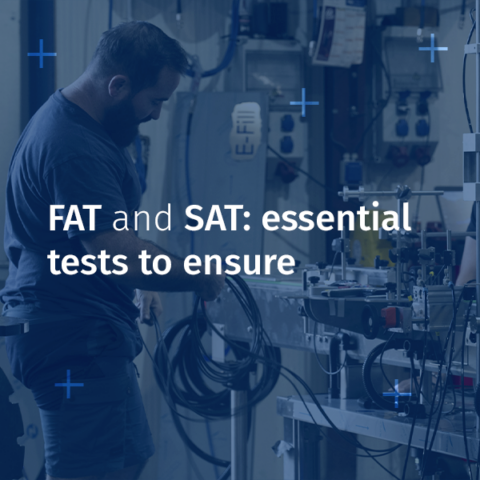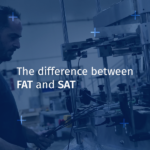At CDA USA, we are committed to delivering robust solutions tailored to the needs of each customer. To achieve this, we have integrated two essential tests into our process: the FAT (Factory Acceptance Test) and SAT (Site Acceptance Test).
Whether it’s filling machines, capping machines, labeling machines, or monoblocks, every machine undergoes real-world testing to ensure full efficiency.
Differences between FAT and SAT
The FAT is conducted at our facilities. This comprehensive test, performed before shipping, ensures the machine meets the customer’s technical expectations. It includes checks on production speed, dosage accuracy, labeling system performance, and compatibility with caps, lids, or seals.
The SAT, on the other hand, takes place at the customer’s site once the installation is complete. This test evaluates how the machine behaves in the actual production environment, where factors like temperature, humidity, product emissions, and floor irregularities can impact performance.
Why are these tests essentials?
These preliminary technical verifications are more than just a routine check. They provide:
- Custom functional validation: The machine is tested with the customer’s specific packaging, products, and consumables.
- Reduced risks: By addressing any issues before delivery, production interruptions are avoided.
- Faster installation: Initial adjustments are already made.
- Reliable start-Up: The customer receives a fully operational machine with no surprises.
Rigorous testing at our facility
For each FAT, CDA uses the actual samples provided by the customer, including bottles, caps, labels, and the final product. This allows us to simulate production configurations realistically.
Our technical teams specifically check:
- Production speeds
- Filling accuracy for fillers
- Capping torque for capping machines
- Label placement accuracy for labelers
Three examples of successful FATs at CDA USA
- The K-Net Auto is an automatic filler ideal for liquids and semi-thick products. During the FAT, we check dosage stability, nozzle flow rate, and automatic cleaning functions.
- The VST is an automatic capping machine often used for T-caps typical in spirits. It is tested for correct cap positioning, tolerance to format variations, and consistent tightening.
- The Ninon Mix is a multi-format labeler that handles various container types. During the FAT, we test different format configurations, sensor responsiveness, label application stability, and smooth transitions between formats.
SAT: The final validation on site
Once the machine is installed, the SAT ensures:
- Integration into the production line
- Adjustment of parameters to the real environment
- Training for the teams on usage and maintenance
- Quick and effective machine take-over
This stage is also the opportunity to fine-tune the final details and ensure the machine is fully operational in the customer’s production context.
More than a test – A relationship of trust
The FAT and SAT are also moments for technical and human exchange. They allow us to:
- Listen to the end users
- Adapt the machine to the daily production environment
- Strengthen the relationship between CDA teams and customers
With CDA, you benefit from packaging machines that are verified, adjusted, and ready to perform. Our fillers, capping machines, and labelers all go through the FAT/SAT dual process, ensuring both performance and reliability.





